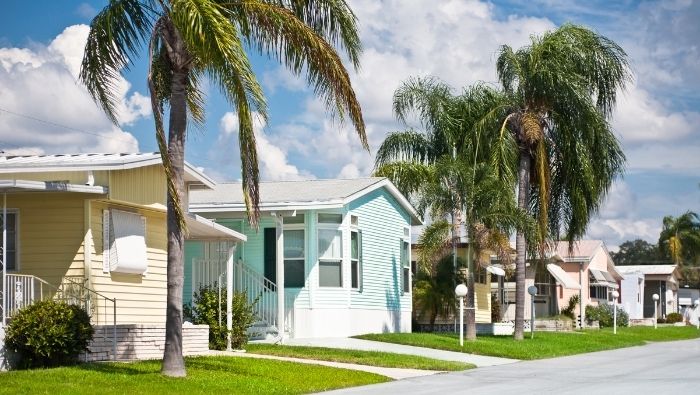Financial Benefits of Living in a Mobile or Manufactured Home
by Debra Karplus

Has the cost of your living situation become too costly? You may discover that living in a mobile or manufactured home may be more cost effective and affordable. We explore the costs of mobile home living.
More than 20 million people live in manufactured homes, commonly referred to as mobile homes or trailers. Mobile homes often get a bad rap, sometimes in the form of jokes about being in a mobile home during a storm and put-downs about the types of people who live in mobile homes.
But, if you have calculated the cost of your current living situation, you may quickly discover that owning and living in a mobile home may be the most cost effective way of having affordable housing, whether you currently rent a place or own one. Estimates state that the cost of mobile home ownership is approximately half compared to a traditional house. That’s a very convincing argument for seriously considering mobile home life.
Actually, mobile homes were built only until 1976. After 1976, these were called “manufactured homes,” a different name because of US Department of Housing and Urban Development (HUD) standards that greatly raised the standards and requirements, improving the quality of these housing units.
Modular homes, on the other hand, are similar, yet different. These are built on-site and cannot be moved. History buffs may recall the Sears mail order homes sold out of their catalogue from 1908 until 1940. Over 70,000 of these homes were sold with there were nearly 500 different styles and designs. Today, you can buy a house on eBay in much the same way!
You deserve a comfortable retirement.
Mobile home ownership has similar types of costs to traditional home ownership, but cheaper.
Unlike your current home, with a mobile home, you typically pay a monthly rent for the lot, plus the one-time cost of the mobile home itself. Lot rental varies by geographic area but expect to pay about $200 for monthly rent.
A mobile home can cost anywhere between $30,000 and $70,000 depending on what you choose. There are single wide and double wide and a choice of amenities as there are with traditional homes. If you have every visited someone living in a mobile home, you already know that many of them are quite luxurious inside and seem very much like any home.
Purchasing a new mobile home or manufactured home and transporting it to your desired location can add a one-time cost of about $25,000 to the equation of mobile home ownership. It may be financially prudent to begin your search for a mobile home with homes that are already situated on a lot in an area that you like. But, if you prefer a brand new, never been lived in before mobile home, it may be worth it to start fresh. If you plan to live in it for ten years for example, that moving cost calculates to a little over $200 monthly in overall cost of mobile home life.
Related: Where Will You Live When You Retire?
The utilities in your mobile home will cost about $1,000 annually. This depends, of course, on the size and layout of your mobile home and the cost of these utilities in your community. You’ll also want homeowners insurance for your mobile home. Expect to pay about $20 monthly, less than half what your friends in traditional homes are probably paying for their insurance. Routine maintenance and repair costs should be significantly less with your mobile home than with a traditional housing unit.
You might still be skeptical about mobile home ownership.
Depending on the design of your mobile home, storm safety, particularly lightning or tornadoes, could be a serious concern. As you would with any home, have a plan of where to go, just in case.
If your mobile home is anchored properly according to HUD regulations with a proper foundation, you should have no more problem with vermin that a family living in a traditional home.
If your mobile home looks shoddy from the outside or is located in an undesirable part of town, you might hear a few snide remarks. But don’t most neighborhoods carry with them some preconceived notions about the types of people who live there?
Choose a nice part of town for your mobile or manufactured home or have “deaf ears” to any derogatory comments regarding the stigma of mobile homes. Landscape your mobile and manufactured home with class and you will be the envy of friends and other visitors.
Reviewed December 2021
About the Author
Debra is an occupational therapist, accountant, teacher and freelance writer. She is a writer for Advance for Occupational Therapy Practitioners. She also writes for Grand Magazine, has some items (fiction and non fiction) selling on Amazon (Kindle), has written several travel articles for the Champaign-Urbana News-Gazette and several articles for freelancewriting.com and volunteers as a money mentor for the University of Illinois Cooperative Extension money mentoring program. Learn more about her at DebraKarplus.blogspot.com.
Sign me up for a comfortable retirement!
Sign me up for a comfortable retirement!
Popular Articles
- Comparing Retirement Housing Options
- How We Retired With Almost No Savings
- How Retirees Can Live on a Tight Budget
- 9 Things You Need to Do Before You Retire
- What You Need to Know About Long Term Care Insurance Before You Retire
- You Didn’t Save Enough for Retirement and You’re 55+
- Could Debt Derail Your Retirement? A Checklist
- Your Emergency Fund In Retirement: A Comprehensive Guide
- Managing Your 401k In Your 50s


